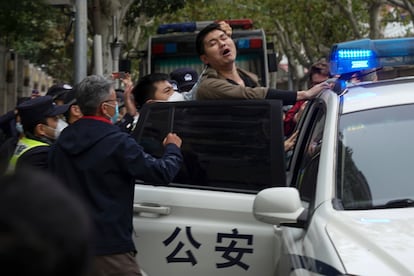Censorship is what you see in China, not what they say was on Facebook and Twitter
As social media removes anti-hoax controls and relegates the serious media to the sidelines, China is jailing the journalist who documented the 2022 Zero-Covid protests in ‘Not the Foreign Force’. Yet Musk claims that the real tyranny comes from Keir Starmer in the United Kingdom

In the plutocracy that is emerging, and whose consequences we can only guess at, the big business magnates do not want to put a stop to hoaxes and hatred, because that would be censorship, but they do want to combat serious journalism, relegated to social networks with this slogan from Elon Musk to X users: “You are the media now.” As firm as they are against alleged woke censorship, in places where there is real censorship, namely in dictatorships, the tech companies do not raise their voices when it does not suit their business.
Mark Zuckerberg’s case is more cynical: only after Donald Trump won the election did he dismantle the moderation and verification policies that Meta (Facebook, Instagram and Threads, as well as WhatsApp) introduced in 2016 under pressure and after a series of scandals. In 2020, with Biden’s victory, he rushed to suspend Trump’s account, as did Twitter, because he was mounting an insurrection, a good reason. But that was before Musk bought Twitter, now X, to save us from the progressives and turn it into a loudspeaker for himself and the alt-right.
The truth is that moderation and verification never really worked on any of the networks. Zuckerberg in 2016 was in the midst of a huge reputational crisis: he had been singled out for Cambridge Analytica’s massive manipulations in Brexit and Trump’s first victory, for the massacre of the Rohingya in Myanmar encouraged on his networks, for his techniques on Instagram to generate addiction in teenagers at the expense of their mental health. Meta was and still is diligent in repressing the sight of a nipple even in the most artistic context possible. And when Twitter was supposedly woke, it was not effective in suppressing death threats or racist, sexist or homophobic insults either, but at least it showed some intent to do so. There are more platforms for disinformation: YouTube has recommended anti-scientific, anti-vaccine and flat-earther delusions to its users, if not outright jihadist or supremacist ones. In all three cases, the problem at this point is no longer deleting toxic content: it would be a step forward if they simply stopped promoting it. At the same time, links from respectable media have been punished in their algorithms.
Elon Musk now calls the UK a “tyranny” because he hates Keir Starmer and supports the far-right Reform UK (just as in Germany he cheers on the neo-Nazis of AfD), but he has never said anything similar about China, where he already manufactures most of his Teslas and pays homage to President Xi Jinping.
In China, the filmmaker Chen Pinlin has just been sentenced to three and a half years in prison for directing the documentary Not the Foreign Force, which recounts the citizen protests in Shanghai against the zero-Covid policy. The film, which he signed under the pseudonym Plato, is available on YouTube (with the option of English subtitles) and details how the population’s discontent erupted in November 2022, after three years of rigid confinement. The spark was the fire in a building in the town of Urumqi, where at least 10 people were burned to death, unable to leave (there were doors blocked with metal wires). The Chinese, who were watching the Qatar World Cup on television in amazement, with the public crowded into the stands without even wearing facemasks, initially went out into the street to place candles in memory of the victims of Urumqi on a street that bears that name.
The documentary, made with few resources and many mobile recordings, but striking all the same, shows how tempers were heating up. The slogans against the zero-Covid policy are aimed at the entire regime. They show blank sheets of paper, a very subversive gesture where it is not necessary to say why you are protesting. They move on to loudly repudiating the Communist Party and Xi himself, to demanding freedom of expression and of the press (which people value more in places where they do not have it). The narration ends with the harsh police repression and mass arrests, but also with the lifting of the most extreme and unsustainable measures against the pandemic by an alarmed government. A BBC correspondent had been arrested (and beaten) in the protests, so the regime already had someone to blame for everything: “foreign agents.” A blanket of silence fell over Urumqi and Shanghai: all mention of these events on the internet was censored.
China is one of the worst countries in the world to be a journalist, according to Reporters Without Borders, but it has tough competition in places like Afghanistan, Eritrea, North Korea, Saudi Arabia, Nicaragua... And, of course, Palestine, where reporters are deliberately targeted by Israeli bombs. Autocrats don’t like a free press, we already knew that, but now the new political-business power class that is emerging in the democratic West doesn’t like it either. They prefer other professionals, those who are experts at intoxication, who have a free hand. If Plato was able to tell the truth with all the weight of the State against him, perhaps it means that giving up is not an option.
Sign up for our weekly newsletter to get more English-language news coverage from EL PAÍS USA Edition
Tu suscripción se está usando en otro dispositivo
¿Quieres añadir otro usuario a tu suscripción?
Si continúas leyendo en este dispositivo, no se podrá leer en el otro.
FlechaTu suscripción se está usando en otro dispositivo y solo puedes acceder a EL PAÍS desde un dispositivo a la vez.
Si quieres compartir tu cuenta, cambia tu suscripción a la modalidad Premium, así podrás añadir otro usuario. Cada uno accederá con su propia cuenta de email, lo que os permitirá personalizar vuestra experiencia en EL PAÍS.
¿Tienes una suscripción de empresa? Accede aquí para contratar más cuentas.
En el caso de no saber quién está usando tu cuenta, te recomendamos cambiar tu contraseña aquí.
Si decides continuar compartiendo tu cuenta, este mensaje se mostrará en tu dispositivo y en el de la otra persona que está usando tu cuenta de forma indefinida, afectando a tu experiencia de lectura. Puedes consultar aquí los términos y condiciones de la suscripción digital.









































